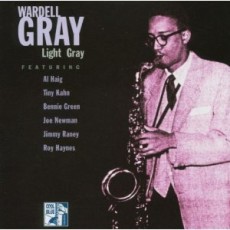
Daily Dose Of Jazz…
Wardell Gray was born the youngest of four children on February 13, 1921 in Oklahoma City, Oklahoma. Though his early years were spent there, in 1929 his family moved to Detroit. By 1935 he attended Northeastern High but soon transferred to Cass Technical High, whose noted alumni were Donald Byrd, Lucky Thompson and Al McKibbon. After year and before graduating Wardell dropped out and began playing the clarinet, but it was hearing Lester Young that drove him to pick up the tenor.
He played around Michigan in various bands led by pianist Dorothy Patton, Jimmy Raschel and Benny Carew and by 1941 a short-lived marriage produced a daughter. Gray got his big break when he joined the Earl Hines Orchestra in 1943, not only nationally known but had nurtured the careers of Dizzy Gillespie and Charlie Parker. For the young tenor he toured all over the country for the next three years becoming a featured soloist and subsequent recordings showed a relaxed, fluent stylist.
After leaving Hines, Wardell settled in Los Angeles and started recording under his own name for the Sunset label. He also worked with Benny Carter, Billy Eckstine and blues singer Ivory Joe Hunter. But it was Central Avenue that he found his greatest pleasure playing after-hours sessions, attracting the owner of Dial Records to hire him to play showcases for Charlie Parker, showing no signs of intimidation. On the avenue Gray held tenor battles with Dexter Gordon and his light sound and swift delivery was a match for Dexter’s big sound. The tenor jousts soon became a symbol for the Central Avenue scene.
With his career moves progressing he joined Benny Goodman’s small groups in 1947 and although musically successful, it was not financially. In ’48-‘50 he moved between Count Basie and Benny Goodman, recorded with Tadd Dameron, ended his second marriage and formed a septet that included Clark Terry and Buddy DeFranco bringing to audiences a very relaxed swinging band. Over the next few years he got married for the third time, did a few recording dates with Art Farmer, Hampton Hawes, Dexter Gordon and Teddy Charles, and performing most notably with Gerald Wilson’s Orchestra trading choruses with Zoot Sims and Stan Getz.
One of the top tenors to emerge during the bop era, Wardell Gray passed away under mysterious circumstances, found on a stretch of desert outside Las Vegas with a broken neck, on May 25, 1955.
More Posts: saxophone


